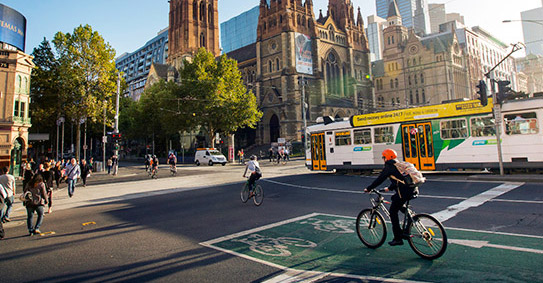Melbourne suburbs eyed as mini office hubs after COVID-19 pandemic
- Posted By Prince Lakshman
The coronavirus outbreak has forced people into isolation. As such, we have only seen a handful of cars on the roads and more people walking in their own neighbourhoods to avail the essentials. Some go to work in the industries categorised as essential, but very few are catching public transport into the city.
All of these things have been happening because people fear catching the virus in public transports.
Once the pandemic is over and we emerge from our home offices to get back to our daily commute, what happens then?
For RMIT urban researcher Thami Croeser, there’s an opportunity to make things safer and easier for workers to get around. However, it could spell into traffic and parking disasters if states won’t be able to do this right.
Mr Croeser’s suggestion is to transform suburbs into mini office or business hubs, with vacant offices and shopfronts used as co-working spaces or satellite offices for large companies who can afford this kind of setup for their employees.
Through this initiative, more people could walk or cycle to work, removing traffic and lessening the need for taking public transport.

From the data he gathered, he was able to identify that 97 per cent Melburnians live within walking or cycling distance of a shopping strip and potential office hub. Moreover, he has developed an interactive map to illustrate areas where office spaces could go, and the number of homes within walking distance.
He said that turning suburbs into office hubs would allow people to continue their practice of social distancing, and at the same time have a separation between work and home.
“Mental health is a real factor here,” he says. “If we’re all not quite ourselves in a year because we’ve been stuck in our houses, I don’t see it being good for the workforce at all.”
Mr Croeser says cities around the world, including New York, Paris and Milan, have already started to plan for more people to be walking and cycling in lieu of catching public transport.
The problem Australian cities like Melbourne have, he says, is that they are more widely spread and people travel longer distances to get to their CBD offices.
“We’re all talking about jumping on bikes and that’s great, but this is also a huge opportunity to shorten distances,” he says.
“When you’ve got a city as big as Melbourne, with people travelling on average 17 kilometres to work, this is our one golden opportunity to really rethink and save people those long commutes.”
People have already begun to ditch their city offices in favour of working in the suburbs, founder of co-working company @Workspaces Jenny Folley says.
“We are being inundated with phone calls,” Ms Folley says. “I have a group of lawyers with offices in the city who are now working from our space in Brighton. They’re loving it and wondering why they ever signed up in the city.”
She says once people see the value of having office space in the suburbs, they find it’s much more convenient – whether they are renting a desk in a co-working space like hers, or setting up a space for staff closer to their homes.
“You can have staff work from the branch in the suburbs, but still have that city address and a head office in the CBD if you need it,” she says.
Mr Croeser says his research could help expedite the process of outer suburban areas including Werribee, Dandenong, Bundoora and Clayton becoming true alternative business hubs for Melbourne – as is the government’s long term strategy.
Source: Domain.com.au

